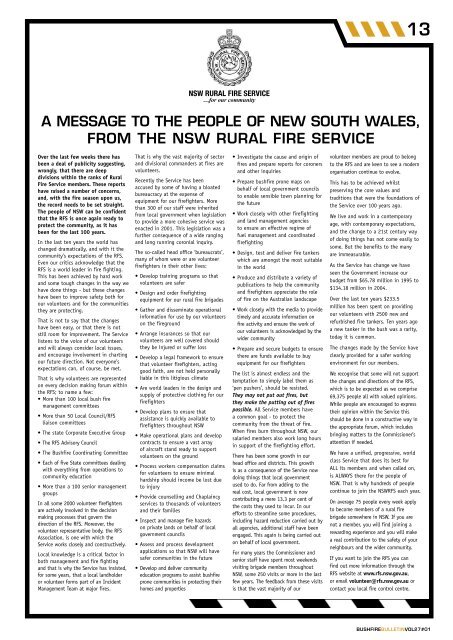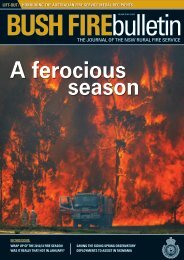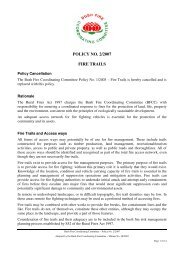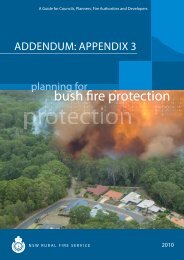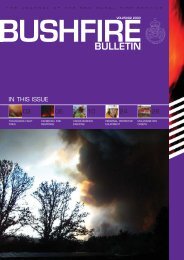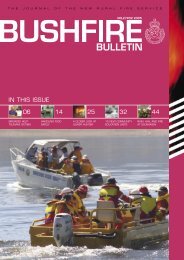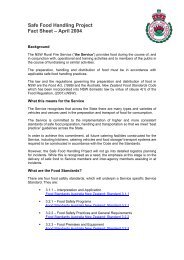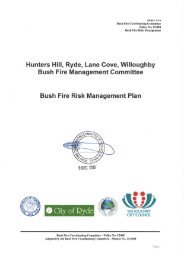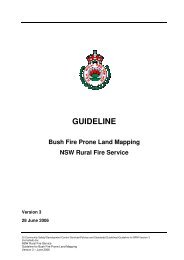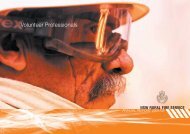to view - NSW Rural Fire Service
to view - NSW Rural Fire Service
to view - NSW Rural Fire Service
Create successful ePaper yourself
Turn your PDF publications into a flip-book with our unique Google optimized e-Paper software.
13<br />
<strong>NSW</strong> RURAL FIRE SERVICE<br />
…for our community<br />
A MESSAGE TO THE PEOPLE OF NEW SOUTH WALES,<br />
FROM THE <strong>NSW</strong> RURAL FIRE SERVICE<br />
Over the last few weeks there has<br />
been a deal of publicity suggesting,<br />
wrongly, that there are deep<br />
divisions within the ranks of <strong>Rural</strong><br />
<strong>Fire</strong> <strong>Service</strong> members. These reports<br />
have raised a number of concerns,<br />
and, with the fire season upon us,<br />
the record needs <strong>to</strong> be set straight.<br />
The people of <strong>NSW</strong> can be confident<br />
that the RFS is once again ready <strong>to</strong><br />
protect the community, as it has<br />
been for the last 100 years.<br />
In the last ten years the world has<br />
changed dramatically, and with it the<br />
community’s expectations of the RFS.<br />
Even our critics acknowledge that the<br />
RFS is a world leader in fire fighting.<br />
This has been achieved by hard work<br />
and some <strong>to</strong>ugh changes in the way we<br />
have done things - but these changes<br />
have been <strong>to</strong> improve safety both for<br />
our volunteers and for the communities<br />
they are protecting.<br />
That is not <strong>to</strong> say that the changes<br />
have been easy, or that there is not<br />
still room for improvement. The <strong>Service</strong><br />
listens <strong>to</strong> the voice of our volunteers<br />
and will always consider local issues,<br />
and encourage involvement in charting<br />
our future direction. Not everyone’s<br />
expectations can, of course, be met.<br />
That is why volunteers are represented<br />
on every decision making forum within<br />
the RFS; <strong>to</strong> name a few:<br />
• More than 100 local bush fire<br />
management committees<br />
• More than 50 Local Council/RFS<br />
liaison committees<br />
• The state Corporate Executive Group<br />
• The RFS Advisory Council<br />
• The Bushfire Coordinating Committee<br />
• Each of five State committees dealing<br />
with everything from operations <strong>to</strong><br />
community education<br />
• More than a 100 senior management<br />
groups<br />
In all some 2000 volunteer firefighters<br />
are actively involved in the decision<br />
making processes that govern the<br />
direction of the RFS. Moreover, the<br />
volunteer representative body, the RFS<br />
Association, is one with which the<br />
<strong>Service</strong> works closely and constructively.<br />
Local knowledge is a critical fac<strong>to</strong>r in<br />
both management and fire fighting<br />
and that is why the <strong>Service</strong> has insisted,<br />
for some years, that a local landholder<br />
or volunteer forms part of an Incident<br />
Management Team at major fires.<br />
That is why the vast majority of sec<strong>to</strong>r<br />
and divisional commanders at fires are<br />
volunteers.<br />
Recently the <strong>Service</strong> has been<br />
accused by some of having a bloated<br />
bureaucracy at the expense of<br />
equipment for our firefighters. More<br />
than 300 of our staff were inherited<br />
from local government when legislation<br />
<strong>to</strong> provide a more cohesive service was<br />
enacted in 2001. This legislation was a<br />
further consequence of a wide ranging<br />
and long running coronial inquiry.<br />
The so-called head office ‘bureaucrats’,<br />
many of whom were or are volunteer<br />
firefighters in their other lives:<br />
• Develop training programs so that<br />
volunteers are safer<br />
• Design and order firefighting<br />
equipment for our rural fire brigades<br />
• Gather and disseminate operational<br />
information for use by our volunteers<br />
on the fireground<br />
• Arrange insurances so that our<br />
volunteers are well covered should<br />
they be injured or suffer loss<br />
• Develop a legal framework <strong>to</strong> ensure<br />
that volunteer firefighters, acting<br />
good faith, are not held personally<br />
liable in this litigious climate<br />
• Are world leaders in the design and<br />
supply of protective clothing for our<br />
firefighters<br />
• Develop plans <strong>to</strong> ensure that<br />
assistance is quickly available <strong>to</strong><br />
firefighters throughout <strong>NSW</strong><br />
• Make operational plans and develop<br />
contracts <strong>to</strong> ensure a vast array<br />
of aircraft stand ready <strong>to</strong> support<br />
volunteers on the ground<br />
• Process workers compensation claims<br />
for volunteers <strong>to</strong> ensure minimal<br />
hardship should income be lost due<br />
<strong>to</strong> injury<br />
• Provide counselling and Chaplaincy<br />
services <strong>to</strong> thousands of volunteers<br />
and their families<br />
• Inspect and manage fire hazards<br />
on private lands on behalf of local<br />
government councils<br />
• Assess and process development<br />
applications so that <strong>NSW</strong> will have<br />
safer communities in the future<br />
• Develop and deliver community<br />
education programs <strong>to</strong> assist bushfire<br />
prone communities in protecting their<br />
homes and properties<br />
• Investigate the cause and origin of<br />
fires and prepare reports for coroners<br />
and other inquiries<br />
• Prepare bushfire prone maps on<br />
behalf of local government councils<br />
<strong>to</strong> enable sensible <strong>to</strong>wn planning for<br />
the future<br />
• Work closely with other firefighting<br />
and land management agencies<br />
<strong>to</strong> ensure an effective regime of<br />
fuel management and coordinated<br />
firefighting<br />
• Design, test and deliver fire tankers<br />
which are amongst the most suitable<br />
in the world<br />
• Produce and distribute a variety of<br />
publications <strong>to</strong> help the community<br />
and firefighters appreciate the role<br />
of fire on the Australian landscape<br />
• Work closely with the media <strong>to</strong> provide<br />
timely and accurate information on<br />
fire activity and ensure the work of<br />
our volunteers is acknowledged by the<br />
wider community<br />
• Prepare and secure budgets <strong>to</strong> ensure<br />
there are funds available <strong>to</strong> buy<br />
equipment for our firefighters<br />
The list is almost endless and the<br />
temptation <strong>to</strong> simply label them as<br />
‘pen pushers’, should be resisted.<br />
They may not put out fires, but<br />
they make the putting out of fires<br />
possible. All <strong>Service</strong> members have<br />
a common goal - <strong>to</strong> protect the<br />
community from the threat of fire.<br />
When fires burn throughout <strong>NSW</strong>, our<br />
salaried members also work long hours<br />
in support of the firefighting effort.<br />
There has been some growth in our<br />
head office and districts. This growth<br />
is as a consequence of the <strong>Service</strong> now<br />
doing things that local government<br />
used <strong>to</strong> do. Far from adding <strong>to</strong> the<br />
real cost, local government is now<br />
contributing a mere 13.3 per cent of<br />
the costs they used <strong>to</strong> incur. In our<br />
efforts <strong>to</strong> streamline some procedures,<br />
including hazard reduction carried out by<br />
all agencies, additional staff have been<br />
engaged. This again is being carried out<br />
on behalf of local government.<br />
For many years the Commissioner and<br />
senior staff have spent most weekends<br />
visiting brigade members throughout<br />
<strong>NSW</strong>, some 250 visits or more in the last<br />
few years. The feedback from these visits<br />
is that the vast majority of our<br />
volunteer members are proud <strong>to</strong> belong<br />
<strong>to</strong> the RFS and are keen <strong>to</strong> see a modern<br />
organisation continue <strong>to</strong> evolve.<br />
This has <strong>to</strong> be achieved whilst<br />
preserving the core values and<br />
traditions that were the foundations of<br />
the <strong>Service</strong> over 100 years ago.<br />
We live and work in a contemporary<br />
age, with contemporary expectations,<br />
and the change <strong>to</strong> a 21st century way<br />
of doing things has not come easily <strong>to</strong><br />
some. But the benefits <strong>to</strong> the many<br />
are immeasurable.<br />
As the <strong>Service</strong> has change we have<br />
seen the Government increase our<br />
budget from $65.78 million in 1995 <strong>to</strong><br />
$134.18 million in 2004.<br />
Over the last ten years $233.5<br />
million has been spent on providing<br />
our volunteers with 2500 new and<br />
refurbished fire tankers. Ten years ago<br />
a new tanker in the bush was a rarity,<br />
<strong>to</strong>day it is common.<br />
The changes made by the <strong>Service</strong> have<br />
clearly provided for a safer working<br />
environment for our members.<br />
We recognise that some will not support<br />
the changes and directions of the RFS,<br />
which is <strong>to</strong> be expected as we comprise<br />
69,375 people all with valued opinions.<br />
While people are encouraged <strong>to</strong> express<br />
their opinion within the <strong>Service</strong> this<br />
should be done in a constructive way in<br />
the appropriate forum, which includes<br />
bringing matters <strong>to</strong> the Commissioner’s<br />
attention if needed.<br />
We have a unified, progressive, world<br />
class <strong>Service</strong> that does its best for<br />
ALL its members and when called on,<br />
is ALWAYS there for the people of<br />
<strong>NSW</strong>. That is why hundreds of people<br />
continue <strong>to</strong> join the <strong>NSW</strong>RFS each year.<br />
On average 75 people every week apply<br />
<strong>to</strong> become members of a rural fire<br />
brigade somewhere in <strong>NSW</strong>. If you are<br />
not a member, you will find joining a<br />
rewarding experience and you will make<br />
a real contribution <strong>to</strong> the safety of your<br />
neighbours and the wider community.<br />
If you want <strong>to</strong> join the RFS you can<br />
find out more information through the<br />
RFS website at www.rfs.nsw.gov.au,<br />
or email volunteer@rfs.nsw.gov.au or<br />
contact you local fire control centre.<br />
BUSHFIREBULLETINVOL27#01


